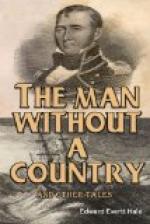“When Anna took the
baby,
And pressed his lips to hers,”
and all of them fell in so cheerily. O dear me! it is a scrap of old Ephrem the Syrian, if they did but know it! And when, after this, Harry would fain have driven on, because two carols at one house was the rule, how the little witches begged that they might sing just one song more there, because Mrs. Alexander had been so kind to them, when she showed them about the German stitches. And then up the hill and over to the North End, and as far as we could get the horses up into Moon Court, that they might sing to the Italian image-man who gave Lucy the boy and dog in plaster, when she was sick in the spring. For the children had, you know, the choice of where they would go, and they select their best friends, and will be more apt to remember the Italian image-man than Chrysostom himself, though Chrysostom should have “made a few remarks” to them seventeen times in the chapel. Then the Italian image-man heard for the first time in his life
“Now is the time of Christmas come,”
and
“Jesus in his babes abiding.”
And then we came up Hanover Street and stopped under Mr. Gerry’s chapel, where they were dressing the walls with their evergreens, and gave them
“Hail to the night,
Hail to the day,”
and so down State Street and stopped at the Advertiser office, because, when the boys gave their “Literary Entertainment,” Mr. Hale put in their advertisement for nothing, and up in the old attic there the compositors were relieved to hear
“Nor war nor battle sound,”
and
“The waiting world was still;”
so that even the leading editor relaxed from his gravity, and the “In-General” man from his more serious views, and the Daily the next morning wished everybody a merry Christmas with even more unction, and resolved that in coming years it would have a supplement, large enough to contain all the good wishes. So away again to the houses of confectioners who had given the children candy,—to Miss Simonds’s house, because she had been so good to them in school,—to the palaces of millionnaires who had prayed for these children with tears if the children only knew it,—to Dr. Frothingham’s in Summer Street, I remember, where we stopped because the Boston Association of Ministers met here,—and out on Dover Street Bridge, that the poor chair-mender might hear our carols sung once more before he heard them better sung in an other world where nothing needs mending.
“King of glory, king
of peace!”
“Hear the song, and
see the Star!”
“Welcome be thou, heavenly
King!”
“Was not Christ our
Saviour?”




